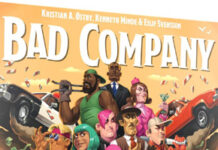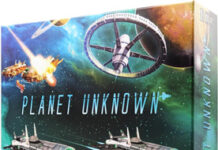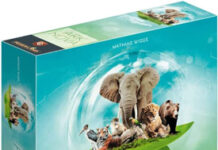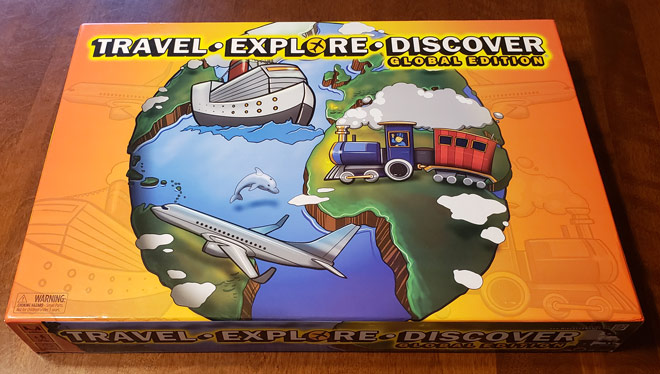
Travel Explore Discover is an educational board game about travelling the globe and learning about exotic locations. The game is published by Discover Games. The game features trip planning and on-the-fly-decisions to modify your itinerary if your plans gets derailed.
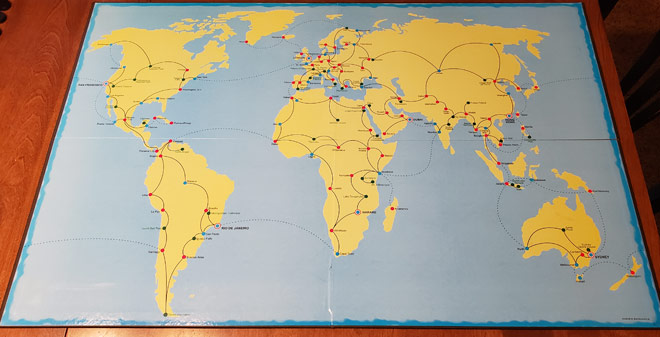
What’s in the box?
- 1 Huge Game Board – 23” x 35”
- 65 Capital Cards – Capital cities
- 40 City Cards – Interesting cities that are not capitals
- 40 Monument Cards – Natural and man made wonders
- 45 Action Cards
- 2 Custom Dice
- 6 Player Tokens
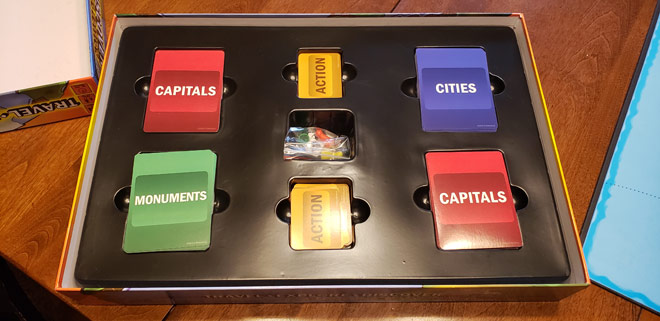
How does the game play
Each player is randomly assigned a starting position on the global map. Then each player randomly takes one Capital card, one Monument card, and one City card. The first player to visit all 3 of their locations wins the game.
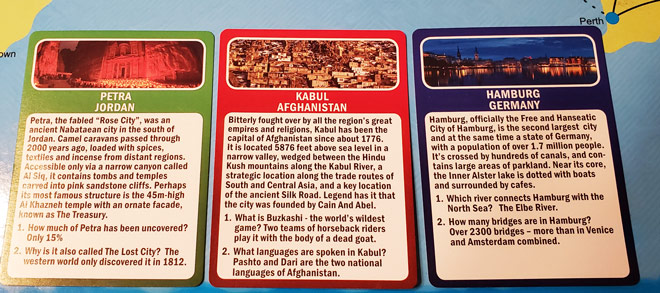
Players will look at the board, and try to secretly plan their trips in their heads. Then they will race each other around the board to visit their 3 locations the fastest. But things won’t always go as originally planned.
You move around the board by rolling the custom dice. The dice side feature:
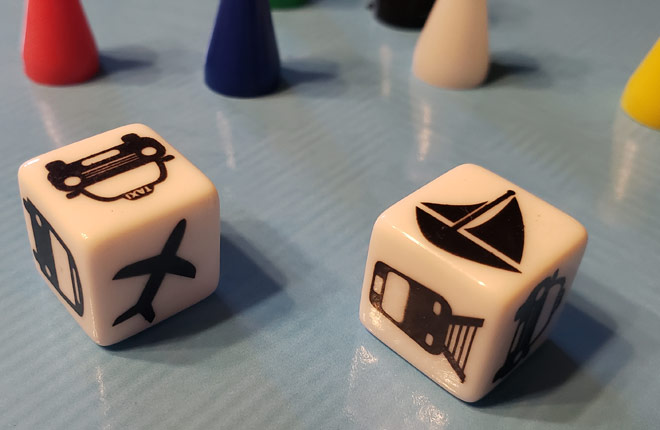
- Taxis – let you move one space along a solid line
- Buses – let you move two spaces along a solid line
- Trains – let you move 3 spaces along a solid line
- Airplanes – Let you fly to any International Airport location on the map
- and Ships – Let you boat to another location along a dotted line if you are in a harbor city
Each player takes turns rolling the dice. You must pick one of the dice rolls and take that action. So, for example, if you roll:
- 1 Jet and 1 Taxi – You must fly to an airport city, or move 1 spot along a solid line on the map.
- 1 Taxi and 1 Train – You can move 1 spot or 3 spots along a solid line on the map.
- 1 Bus and 1 Boat – You can move 2 spots along a solid line on the map or travel along a boating route as long as you are in a harbor town.
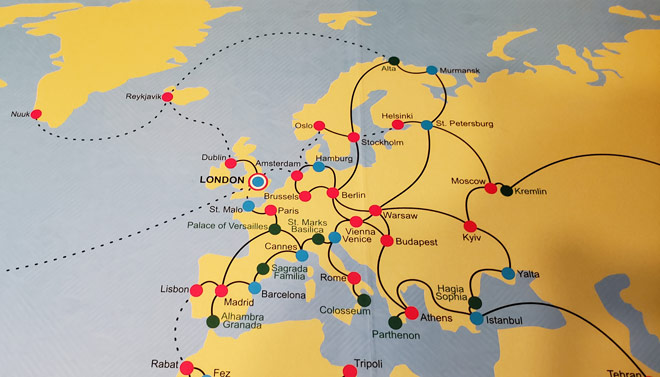
If you can’t take a legal action with the dice, then you must take an Action card. Let’s pretend you started the game in Nuuk, Greenland. The travel map only allows you to fly or boat. If you roll a Train and a Bus, then you can’t move, and you must take an Action card.
Action cards can be good for you, bad for you, or mean for other players. Here are some examples of Action cards:
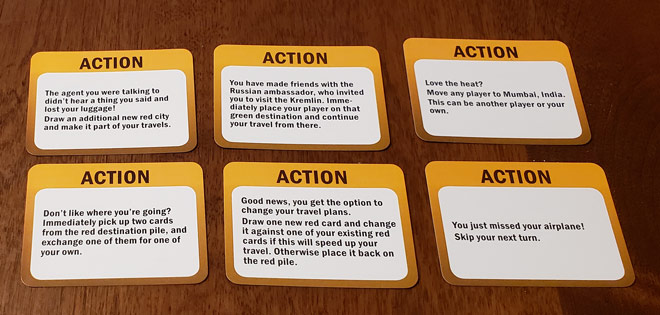
After you reach a destination, you are supposed to read facts about your destination to everyone at the table, and quiz them with a question at the bottom of the card. The person that gets the answer right, gets a free turn.
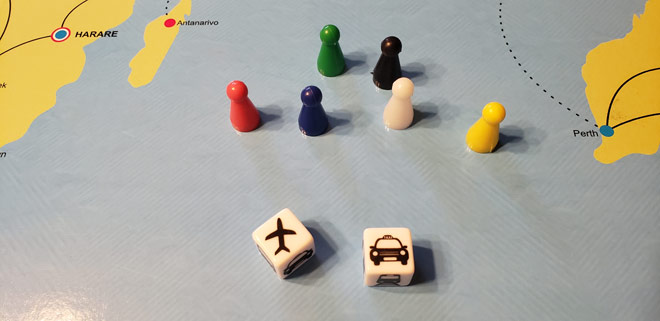
Likes
I am pretty bad with geography. I went to religious schools growing up, and the schools emphasized religion over geography. During one of my game plays, the game dictated me to visit Atar, Mauritania. I had no clue where the heck Atar was! And I did not want to announce out loud “I need help finding Atar”, because other players might see me getting close to Atar and toss a nasty Action Card at me. That left me reading the informational card for clues. The info on the card talked about “The Blue Eye of Africa” and the Sahara desert. I coyly look at the game board, and Bingo! I found Atar on the northwest side of Africa. The game was secretly teaching me geography, and I know what the The Blue Eye of Africa is.
The components are all well made. The cards are made from nice card stock. And the custom dice are pretty cool.
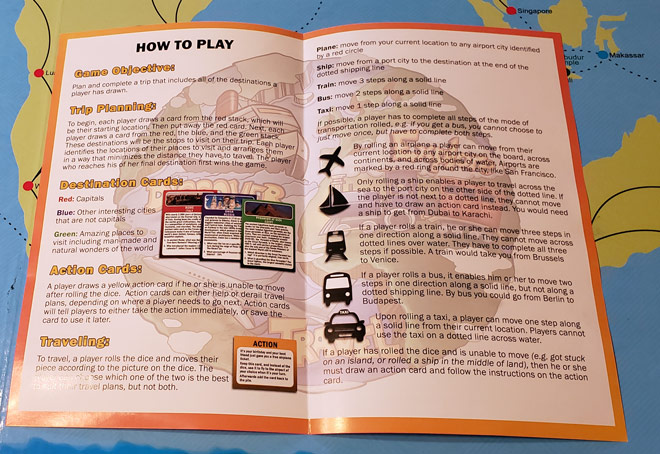
This is a very easy game to teach and learn. The rule book is in full color, and is only 4 pages long, And the rulebook does a wonderful job explaining the game.
This is a good game for families. It is basically a racing game that teaches everyone a little more about world geography.
The board is huge, with easy to see locations. And it is fun to move your token around the board as you travel the globe in a race to beat your friends and family.
The game does not overstay its welcome. The box says 60-120 minutes, but we played our games much faster than that.
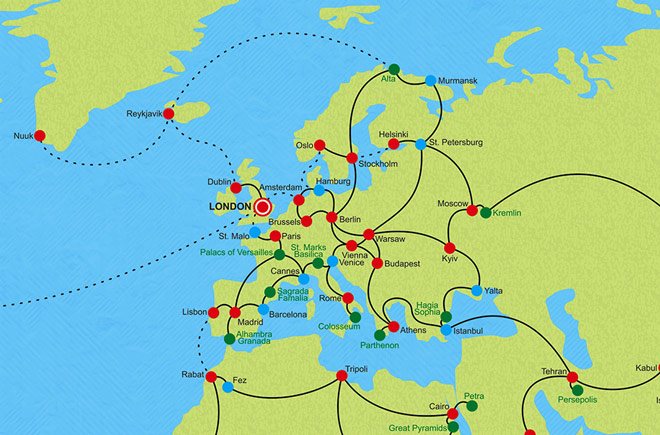
Dislikes
Luck has a potential to make the game feel unfair at times. You might be assigned places that are hard to visit (i.e. islands), while one of your opponents gets 3 places nicely grouped together in Europe. There is also the potential to get horrible dice rolls during the game, derailing your travel plans like crazy.
I listed the game board as a “Like” but the board might be bad for people with small gaming tables. The game board is huge (about 2 ft. x 3 ft.), and might take up a lot of room on your gaming table. I have a very large gaming table at home, but this board might be too big for some gamers. Luckily you don’t need too much room off the board, except to roll the dice.
I do not like the part of the game where you ask other players questions after you complete one of your 3 mandatory location visits. Some of the questions are really offbeat, and only players that have played this game a lot will likely know the answers. This is not fair to the newer players at the table. This also promotes yelling and shouting in a game with large player counts. We eliminate this part of the game when we play. You want people to learn geography, and not be disgruntled when they don’t know the answers.
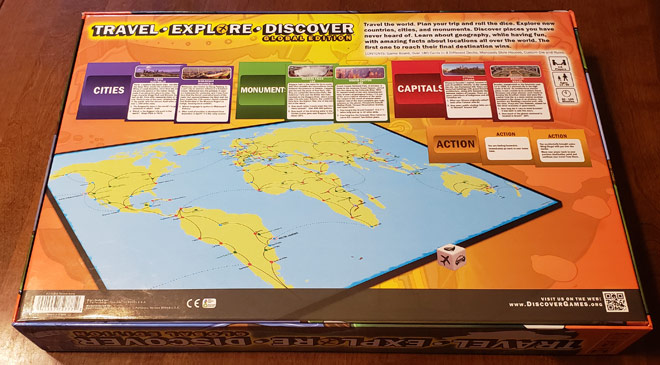
The game board has a lot of dead blue space in the oceans. It might have been nice if a section of an ocean explained what each of the die rolls do for newer players – Kind of like the scoring of trains inset on a Ticket to Ride game board.
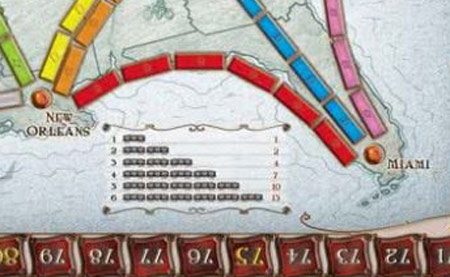
Final Thoughts
Overall, Discover Explore Travel is a pretty fun geography-based educational game. Our family has had fun racing around the globe. Sure, there can be good and bad luck involved here, but this will not get too many people disgruntled. You know that luck is a factor going into the game, and you try to adapt the best you can, and see if you can still pull off a stunning victory.
There can be a tiny bit of “Take that!” in this game. Some action cards will allow opponents to move you to another location on the board. This might actually help you at times, as other players might move you nearer to one of your exotic destinations.
This game is available directly from Discover Games if you are interested in picking up a Geography based board game.

